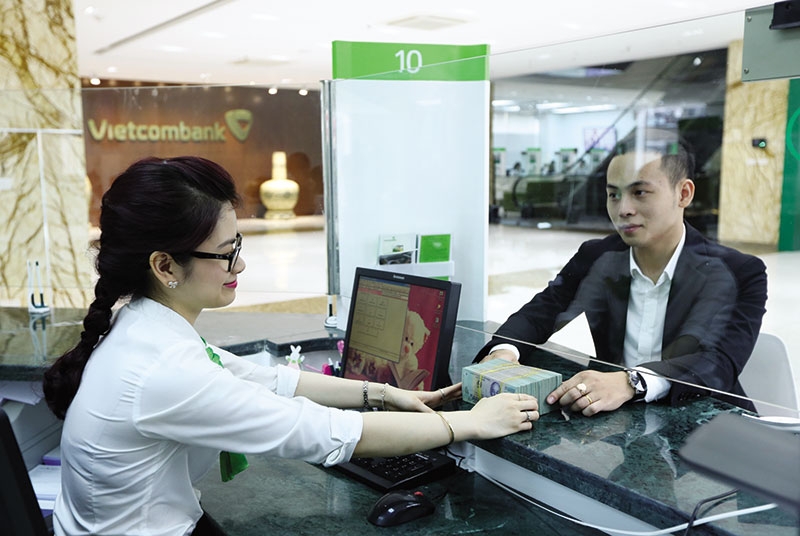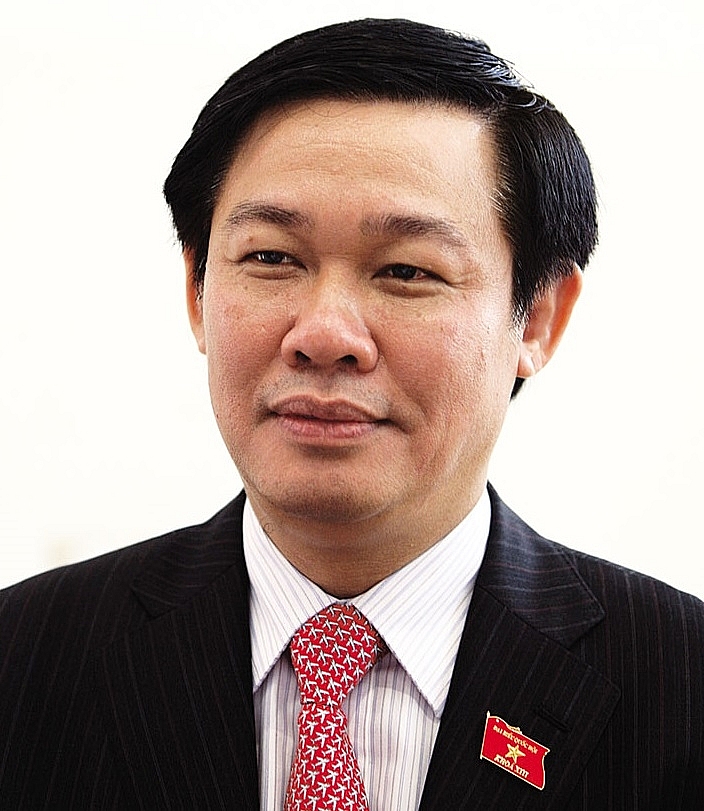Banks prepare to raise game and list on overseas bourses
 |
| Listing on overseas stock exchanges is an ambitious endeavour for Vietnamese banks, Photo: Dung Minh |
In its Decision No.986/QD-TTg dated August 8, the Vietnamese government set out a clear pathway for the strategic development of the Vietnamese banking sector for the period 2018-2025, with a vision towards 2030. Accordingly, in the first phase of 2018-2020, Vietnam will continue to clean up its banking system by resolving the issue of non-performing loans (NPL) and troubled lenders on a market mechanism basis and reducing the number of credit institutions to ensure better health for the entire sector.
By the end of 2020, Vietnam looks to have at least 12-15 banks fully compliant with Basel II standards and one or two banks making it into the region’s top 100 largest banks in terms of assets.
As for larger ambitions, in the next phase of 2021-2025, the local banking sector is expected to improve its competitive capacity, transparency, and corporate management in line with international practices, which, at the end of the day, could pave the way for two to three banks to enter the list of the top 100 Asian banks in terms of assets and pave the way for three to five to get listed on international stock exchanges.
As part of the plan, the government will reduce its holdings in state-owned BIDV (in which it holds 95.28 per cent) and Vietcombank (77.11 per cent) to 65 per cent, while maintaining its holding at VietinBank (64.46 per cent) in the first phase, then trimming all three holdings down to 51 per cent in the second phase, all to prepare for their listing overseas. For state-controlled Agribank, the same divestment path will also be applied, but to prepare for its listing on the local stock exchanges.
Solving the puzzle
Given the underlying objectives set for the banking sector, the government is doing what it can to once again entice the interest of foreign investors in the industry, which was lost in a divestment spree where foreign banks put an end to their long-term investment at their local counterparts, seen in the cases of HSBC, Standard Chartered, and BNP Paribas. Adding to the gloomy picture, a deal to purchase stakes between Vietcombank and Singapore’s sovereign wealth fund GIC fell apart as a result of a disagreement over the price of stock between the parties.
“We see that the first wave of divestment happened as foreign banks deemed there was no use to hold on to 20 per cent of a local bank, where they had no voice or control over the bank’s operation. Along comes the second wave, with foreign funds injecting money in local bank stocks, wishing to make a sound return, then moving on to other investments elsewhere,” said Duong Nguyen, financial services partner at EY Vietnam.
“And it could be the third wave that now arrives, where we may expect fresh deals for more foreign banks to own 100 per cent of local banks. But it’s really up to the government’s openness on this, whether to allow the market to self-govern the situation and let strong foreign players come in to set a new bar for the game for local players,” Duong told VIR.
With the government’s attempt to reduce its involvement at the state-owned banks to a certain degree, the slice of the cake available to investors will get bigger, according to Duong. “With the rising supply of bank stocks in the market, it will just depend on the price of these stocks whether they attract investors. This, ultimately, goes back to the valuation of the banks themselves to determine the fair price.”
According to Sung Mee Hong, partner in the corporate and M&A practice groups at South Korean law firm Lee & Ko, one of the factors inhibiting foreign investors from becoming strategic investors in banks in Vietnam was the foreign ownership limit (FOL). With the new strategy now in place, foreign investors can “think positively about making investments in banks in Vietnam”, she said
“In addition to the reduction of the state ownership, the FOL should also be alleviated in order to make room for foreign investments, especially for those banks that have reached their FOL,” she added.
“Moreover, for South Korean investors, especially in the banking sector, there are other factors that are important for their investment decisions, including the investor’s ability to participate in the management and control of the banks, to make contributions to enhancing the technology and operation systems of the banks, and to contribute to improvements in the corporate governance, transparency, adoption of international accounting standards, and more. The reduction of the state ownership may be a positive factor, but it may not be the deciding factor,” Hong said.
Corporate governance still an issue
Referring to a beauty contest where contestants must be able to show their intelligence and talents on top of their appearance in order to win, EY’s Duong stressed that banks, to be tempting for potential buyers, ought to showcase their enhanced corporate management and risk management.
She cited the 2017 report on the ASEAN Corporate Governance Scorecard released by the Asian Development Bank as showing that Vietnam scored the lowest on corporate governance criteria (only 36.75 points), far behind Indonesia (62.38 points) and other countries such as Singapore, Thailand, Malaysia, and the Philippines. “Among the 55 Vietnamese companies on the list, 62.5 per cent scored between 20 and 40 points, and 25 per cent between 40 and 50 points. There are eight banks on this list, but none made it to the top three. Only three were ranked in the top 10, and six were in the top 30. This means the corporate governance level at Vietnamese banks is still very low, discouraging foreign credit institutions from injecting capital.”
In the ASEAN, almost all credit institutions use the ASEAN Corporate Governance Scorecard to evaluate corporate governance. The list includes well-known names like CIMB, Siam Bank, DBS Group Holdings, United Overseas Bank, and MayBank. With this in mind, Vietnamese banks should improve their corporate governance standards based on this scorecard if they want to attract long-term capital from overseas, noted Duong.
Regarding the issue of listing banks overseas, Chua Hak Bin, senior economist at Maybank Kim Eng, said that although Vietnamese banks have made a lot of progress in recent years in terms of solving NPLs and expanding credit, it is a different story when it comes to listing banks overseas.
“Banking is a sensitive sector, and even in other countries in the region, there are not a lot of banks that list outside their home country,” he said in an interview in Ho Chi Minh City last week.
Vietnamese banks, as Bin noted, still have a low foreign ownership cap and many corporate governance issues, which are issues that need to be solved before raising foreign capital. “The Vietcombank-GIC deal has garnered lots of attention but has stalled, and maybe we can take lessons from that,” he said.
“I believe that it’s challenging to list Vietnamese banks on overseas stock exchanges, so this should be a long-term process,” said economist Nguyen Tri Hieu. “Vietnamese banks should focus on solving existing problems before choosing to list overseas–which is a major goal for the long term.”
Last week, Moody’s Investors Service upgraded the long-term local and foreign currency deposit and issuer ratings of Vietcombank, BIDV, and VietinBank. The credit rating agency also upgraded the long-term counterparty risk ratings and counterparty risk assessments of VietinBank and BIDV, while affirming those of Vietcombank.
| Vuong Dinh Hue - Deputy Prime Minister
The core fields for restructuring in Vietnam currently are finance and banking, operation of state-owned enterprises, public investment, state budget revenue and expenditure, public debts, and streamlining non-productive units. In terms of restructuring the finance and banking sector, Vietnam is doing an attentive job on tackling bad debts. The rate of bad debts has gone down quickly, from 10.8 per cent in early 2016 to 6.9 per cent early this June, on and off the balance sheet. The Vietnamese government is set to accelerate the pace of credit institutions restructuring. Towards this goal, the government is stimulating M&As among small commercial banks and credit institutions to form larger ones to bolster management efficiency. In the future, the government will not grant additional licences to establish wholly foreign-owned banks in Vietnam, but will encourage foreign banks to buy underperforming local banks to become wholly foreign-owned banks in Vietnam, a move that is grabbing a lot of attention from investors. The government will continue state capital divestment at state-owned commercial banks. One of Vietnam’s largest commercial banks–Agribank–is set to hold its initial public offering in 2019. Other state banks such as BIDV and Vietcombank are working on plans to sell further stakes to domestic and foreign investors. |
What the stars mean:
★ Poor ★ ★ Promising ★★★ Good ★★★★ Very good ★★★★★ Exceptional
 Tag:
Tag:
Related Contents
Latest News
More News
- EU and Vietnam elevate relations to a comprehensive strategic partnership (January 29, 2026 | 15:22)
- Vietnam to lead trade growth in ASEAN (January 29, 2026 | 15:08)
- Japanese business outlook in Vietnam turns more optimistic (January 28, 2026 | 09:54)
- Foreign leaders extend congratulations to Party General Secretary To Lam (January 25, 2026 | 10:01)
- 14th National Party Congress wraps up with success (January 25, 2026 | 09:49)
- Congratulations from VFF Central Committee's int’l partners to 14th National Party Congress (January 25, 2026 | 09:46)
- 14th Party Central Committee unanimously elects To Lam as General Secretary (January 23, 2026 | 16:22)
- Worldwide congratulations underscore confidence in Vietnam’s 14th Party Congress (January 23, 2026 | 09:02)
- Political parties, organisations, int’l friends send congratulations to 14th National Party Congress (January 22, 2026 | 09:33)
- Press release on second working day of 14th National Party Congress (January 22, 2026 | 09:19)























 Mobile Version
Mobile Version